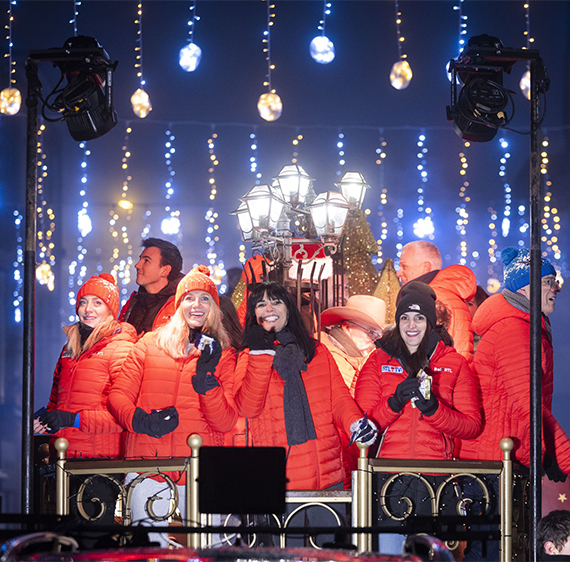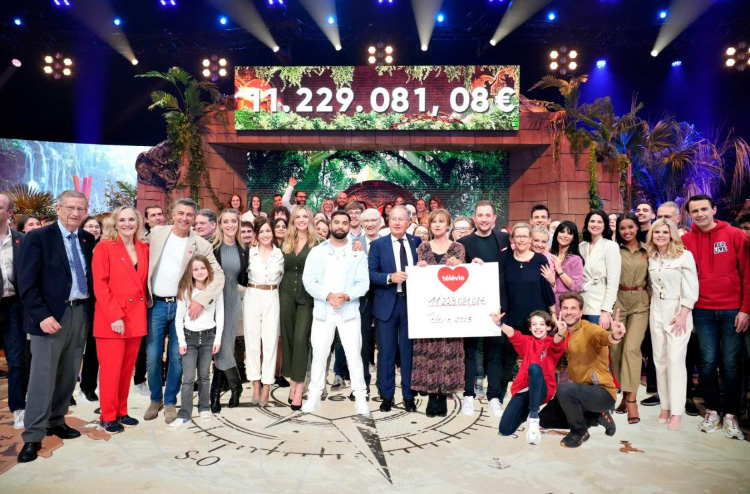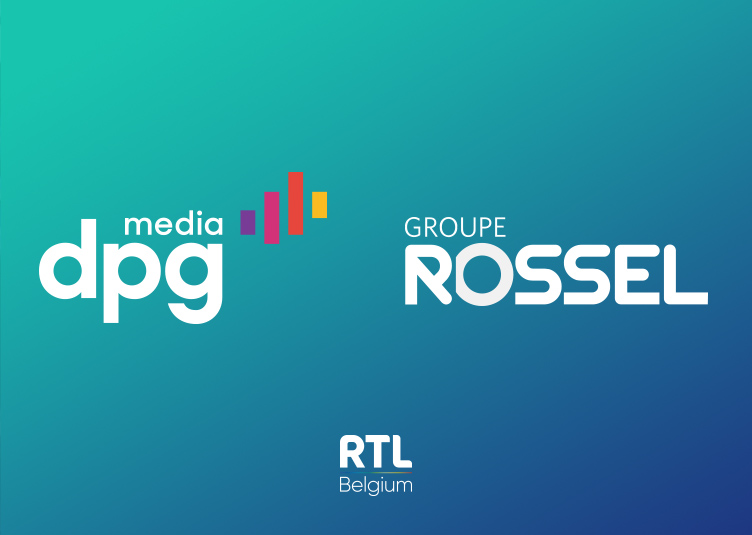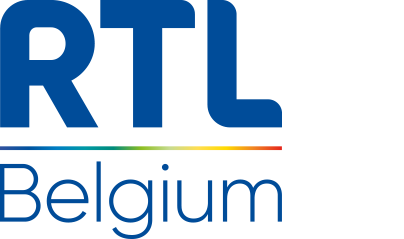OUR
MISSION
Our mission: to entertain, inform and bring people together.
We focus on the human element, the connection between people and the passion through which our teams create our content.

Our mission: to entertain, inform and bring people together.
We focus on the human element, the connection between people and the passion through which our teams create our content.
TÉLÉVIE


NOS
ACTIONNAIRES

array(5) {
["titre"]=>
string(92) "NOS
ACTIONNAIRES"
["texte"]=>
string(782) "DPG Media et le Groupe Rossel sont chacun actionnaire à 50% de RTL Belgium. En Belgique francophone, le Groupe Rossel est l’éditeur du Soir et des médias régionaux de Sudinfo ainsi que les magazines Cine Tele Revue et Soir Magazine. La société est également co-éditeur des médias financiers de Mediafin (De Tijd, L’Echo) et participe dans le domaine de services en ligne tels que la plateforme Vlan. Elle est par ailleurs active en France, où elle détient de nombreux médias leaders au nord de Paris et investit dans de nombreuses Start-Up technologiques et digitales. L’entreprise média DPG Media Group est active en Belgique, aux Pays-Bas et au Danemark avec des marques telles que VTM, Het Laatste Nieuws, Humo, QMusic, de Volkskrant, Berlingske en Independer."
["bloc_cta"]=>
array(6) {
[""]=>
NULL
["page"]=>
bool(false)
["lien_externe"]=>
string(35) "https://www.dpgmediagroup.com/fr-BE"
["apparence"]=>
string(5) "blanc"
["label"]=>
string(9) "DPG Media"
["attribut"]=>
string(0) ""
}
["bloc_cta_22_bloc_cta"]=>
array(6) {
[""]=>
NULL
["page"]=>
bool(false)
["lien_externe"]=>
string(22) "https://www.rossel.be/"
["apparence"]=>
string(5) "blanc"
["label"]=>
string(13) "Groupe Rossel"
["attribut"]=>
string(0) ""
}
["visuel"]=>
array(24) {
["ID"]=>
int(16946)
["id"]=>
int(16946)
["title"]=>
string(16) "Nos Actionnaires"
["filename"]=>
string(20) "Nos-Actionnaires.jpg"
["filesize"]=>
int(99067)
["url"]=>
string(73) "https://www.rtlbelgium.be/wp-content/uploads/2023/05/Nos-Actionnaires.jpg"
["link"]=>
string(45) "https://www.rtlbelgium.be/nos-actionnaires-2/"
["alt"]=>
string(0) ""
["author"]=>
string(1) "1"
["description"]=>
string(0) ""
["caption"]=>
string(0) ""
["name"]=>
string(18) "nos-actionnaires-2"
["status"]=>
string(7) "inherit"
["uploaded_to"]=>
int(0)
["date"]=>
string(19) "2023-05-25 13:10:29"
["modified"]=>
string(19) "2023-05-25 13:10:29"
["menu_order"]=>
int(0)
["mime_type"]=>
string(10) "image/jpeg"
["type"]=>
string(5) "image"
["subtype"]=>
string(4) "jpeg"
["icon"]=>
string(62) "https://www.rtlbelgium.be/wp-includes/images/media/default.png"
["width"]=>
int(752)
["height"]=>
int(535)
["sizes"]=>
array(42) {
["thumbnail"]=>
string(81) "https://www.rtlbelgium.be/wp-content/uploads/2023/05/Nos-Actionnaires-150x150.jpg"
["thumbnail-width"]=>
int(150)
["thumbnail-height"]=>
int(150)
["medium"]=>
string(81) "https://www.rtlbelgium.be/wp-content/uploads/2023/05/Nos-Actionnaires-300x213.jpg"
["medium-width"]=>
int(300)
["medium-height"]=>
int(213)
["medium_large"]=>
string(73) "https://www.rtlbelgium.be/wp-content/uploads/2023/05/Nos-Actionnaires.jpg"
["medium_large-width"]=>
int(660)
["medium_large-height"]=>
int(470)
["large"]=>
string(73) "https://www.rtlbelgium.be/wp-content/uploads/2023/05/Nos-Actionnaires.jpg"
["large-width"]=>
int(660)
["large-height"]=>
int(470)
["1536x1536"]=>
string(73) "https://www.rtlbelgium.be/wp-content/uploads/2023/05/Nos-Actionnaires.jpg"
["1536x1536-width"]=>
int(752)
["1536x1536-height"]=>
int(535)
["2048x2048"]=>
string(73) "https://www.rtlbelgium.be/wp-content/uploads/2023/05/Nos-Actionnaires.jpg"
["2048x2048-width"]=>
int(752)
["2048x2048-height"]=>
int(535)
["partners-logos"]=>
string(81) "https://www.rtlbelgium.be/wp-content/uploads/2023/05/Nos-Actionnaires-281x200.jpg"
["partners-logos-width"]=>
int(281)
["partners-logos-height"]=>
int(200)
["news-thumb-1"]=>
string(81) "https://www.rtlbelgium.be/wp-content/uploads/2023/05/Nos-Actionnaires-636x496.jpg"
["news-thumb-1-width"]=>
int(636)
["news-thumb-1-height"]=>
int(496)
["news-thumb-2"]=>
string(81) "https://www.rtlbelgium.be/wp-content/uploads/2023/05/Nos-Actionnaires-636x535.jpg"
["news-thumb-2-width"]=>
int(636)
["news-thumb-2-height"]=>
int(535)
["news-thumb-3"]=>
string(81) "https://www.rtlbelgium.be/wp-content/uploads/2023/05/Nos-Actionnaires-636x535.jpg"
["news-thumb-3-width"]=>
int(636)
["news-thumb-3-height"]=>
int(535)
["news-thumb-4"]=>
string(81) "https://www.rtlbelgium.be/wp-content/uploads/2023/05/Nos-Actionnaires-636x535.jpg"
["news-thumb-4-width"]=>
int(636)
["news-thumb-4-height"]=>
int(535)
["news-big"]=>
string(73) "https://www.rtlbelgium.be/wp-content/uploads/2023/05/Nos-Actionnaires.jpg"
["news-big-width"]=>
int(752)
["news-big-height"]=>
int(535)
["news-big-v2"]=>
string(73) "https://www.rtlbelgium.be/wp-content/uploads/2023/05/Nos-Actionnaires.jpg"
["news-big-v2-width"]=>
int(752)
["news-big-v2-height"]=>
int(535)
["post-thumbnail"]=>
string(81) "https://www.rtlbelgium.be/wp-content/uploads/2023/05/Nos-Actionnaires-752x510.jpg"
["post-thumbnail-width"]=>
int(752)
["post-thumbnail-height"]=>
int(510)
}
}
}


NOTRE
HISTOIRE
2023
Le 30 juin 2023, la phase ultime de la simplification administrative de la constellation des différentes sociétés de RTL Belgium a eu lieu : INADI SA, COBELFRA SA, IP BELGIUM SA et RTL Belux & Cie S.A. ont été absorbées par RTL Belgium SA. Toutes les activités sont donc regroupées au sein d’une seule et même entité juridique : RTL Belgium SA !
2023
Le mardi 28 mars 2023, RTL Belgium dévoile sa nouvelle architecture amène un vent de fraîcheur et de modernité pour toutes les marques RTL. Cette évolution marque la volonté de RTL de s’inscrire dans le changement avec des marques médias et des contenus plus impactants et plus attractifs à travers une identité plus consistante, plus cohérente et plus simple. Cette vision transversale a engendré un travail en profondeur pour renforcer la pertinence et la complémentarité des marques tout en conservant les spécificités de chacune d’entre elles. La naissance de ces nouvelles identités visuelles va de pair avec le déploiement de la toute première campagne de communication transversale de l’histoire de RTL Belgium et un slogan, qui tient en trois mots et sept lettres : “on est là”.
2023
Le 23 mars 2023, RTL Belgium s’établit définitivement en Fédération Wallonie-Bruxelles. L’ancrage plein et entier de RTL Belgium dans le giron de la Fédération Wallonie-Bruxelles, et ce au bénéfice des citoyennes et des citoyens francophones mais aussi de l’écosystème médiatique belge. RTL Belgium entre pleinement dans le cadre juridique francophone en tant qu’acteur local, notamment en ce qui concerne les règles en matière de publicité, de protection des mineurs, et de contribution à la production audiovisuelle, notamment de séries.
2022
Le 14 juin 2022, Guillaume Collard devient le nouveau CEO de RTL Belgium
2022
Le 31 mars 2022, DPG Media et le Groupe Rossel finalisent l’acquisition de RTL Belgium. DPG Media et Rossel sont dorénavant chacun actionnaire à 50% de RTL Belgium, qui comprend les chaînes de télévision RTL tvi, RTL club et RTL plug, l’offre de streaming RTL play, les radios bel RTL et Radio Contact ainsi que leurs webradios, la plateforme d’information RTL info et la régie publicitaire IP Belgium.
2018
Le 26 mars 2018, la plateforme RTLplay voit le jour. RTLplay, c’est l’ensemble des contenus RTL mais aussi des contenus exclusifs disponibles partout, tout le temps et gratuitement, sur tous les supports digitaux, smartphone, tablette ou ordinateur et sur les TV via Chromecast, Android et Apple TV. Entièrement gratuite, RTLplay a pour objectif d’étendre l’expérience RTL offerte aux téléspectateurs sur l’ensemble des supports disponibles.
2016
Le 4 janvier 2016, Mint revient grâce à un partenariat avec les réseaux provinciaux Must FM, Maximum FM et BXFM la radio indépendante..
2015
En novembre 2015, RTL à l’infini est disponible en application sur l’Android Market et l’Apple Store. RTL à l’infini est alors accessible via une connexion internet sur les ordinateurs, tablettes et smartphones. RTL à l’infini est disponible tout le temps, partout et sur tous les supports.
2015
Bel RTL se décline en radio-vision en septembre 2015. La chaîne de radio-vision est disponible sur le site internet et sur certains canaux de télédistribution en Belgique francophone.
2014
Fin 2014, le journal de RTL-TVi est rebaptisé RTL info. Le concept est repensé, tant au niveau éditorial que de la mise en image et des processus de production. Un écran panoramique HD de 14 mètres de long anime le studio du RTL info.
2012
En mars 2012, RTL Belgium s’associe à Mobistar pour relancer Plug Mobile qui deviendra Plug Mobile by Mobistar. Cette nouvelle offre téléphonique donne un accès gratuit aux contenus des trois chaînes de RTL Belgium via la 3G.
2011
Radio Contact lance à son tour sa marque de téléphonie, Contact Mobile en septembre 2011. Un produit aux tarifs avantageux et à l’identité forte, caractéristique principale de la première chaîne de radio musicale en Belgique francophone. Contact Mobile est né d’un partenariat entre KPN Group Belgium et RTL Belgium. En décembre 2015, Contact Mobile devient Allo RTL.
2009
En juin 2009, le lancement d’une nouvelle formule d’abonnement mobile appelée Allo RTL voit le jour. En plus de téléphoner et d’envoyer des sms, les abonnements permettent de regarder RTL-TVi, Club RTL et Plug RTL partout alors que l’accès au site RTL info est disponible en illimité.
2009
Radio Contact lance sa chaîne de télévision musicale, Contact Vision en 2009. Cette chaîne de radio-vision est disponible sur radiocontact.be et est distribuée sur toutes les plates-formes numériques en Belgique francophone.
2007
En 2007, RTL Belgium lance RTL à l’infini, son service de vidéo à la demande (VOD) d’abord disponible sur les décodeurs de Belgacom TV. Maintenant, l’offre est disponible chez tous les opérateurs. RTL à l’infini propose également un service de FVOD (Free Video On Demand), TVOD (Transactional Video On Demand) et SVOD (Subscription Video On Demand).
2007
Plug Mobile by Proximus voit le jour en janvier 2007, lorsque Proximus annonce le lancement d’une nouvelle offre prépayée en collaboration avec la chaîne de télévision Plug TV (actuellement Plug RTL).
2007
En janvier 2007, la radio Mint voit le jour et interpelle directement médias et auditeurs par son originalité. En quelques mois, plus de 120.000 auditeurs adhèrent quotidiennement au slogan « La musique a meilleur goût ». En octobre 2008, il est mis fin à son existence en FM, la radio se transforme en webradio.
2006
En octobre 2006, le bâtiment de 14.500 m² de l’Avenue Ariane n’était plus à même de répondre aux projets audiovisuels du groupe en pleine expansion. Le choix a alors été fait pour la construction d’un bâtiment de 170 mètres de façade et d’une superficie de 18.500 m². La famille RTL Belgium quitte l’Avenue Ariane pour s’installer au coin de la chaussée de Louvain et de l’avenue Jacques Georgin à Schaerbeek.
2004
En février 2004, la nouvelle et troisième chaîne de télé du groupe RTL, Plug TV (rebaptisée Plug RTL en 2008), adopte un ton plus décalé.
1999
En 1999 sont créés les sites web des chaînes RTL. RTL info verra le jour en 2007 et les applications mobiles en 2010.
1995
TVi SA anticipe les évolutions de la télévision : en 1995, la deuxième chaîne du groupe est mise sur antenne ; il s’agit de Club RTL.
1991
En 1991, TVi SA, associée au groupe de presse Rossel, crée Bel RTL, la première radio généraliste privée du sud du pays. Radio Contact, la première radio musicale belge, rejoint ensuite le groupe.
1987
Le 12 septembre 1987, la chaîne RTL-TVi (abréviation de Radio Télévision Luxembourg – Télévision Indépendante) est lancée.
1986
Le 30 juillet 1986, marque la signature d’une convention pour l’exploitation de la télévision privée de la Communauté française avec TVi SA.
1985
En 1985, de nombreuses chaînes de télévision sont diffusées sur le territoire belge. Le gouvernement doit réglementer l’audiovisuel. Une loi prévoit désormais de n’accorder la diffusion de publicité commerciale qu’à une seule chaîne (dont le Conseil d’administration comprend au moins un représentant de la presse écrite) par Communauté linguistique. En juin 1985, le groupe Audiopresse, réunissant l’ensemble de la presse écrite quotidienne, choisit RTL Télévision comme chaîne commerciale et signe une convention-cadre avec la CLT. En décembre 1985, Audiopresse, la CLT et sa filiale belge TV TEAM créent la société TVi SA.
1984
Dès septembre 1984, RTL Télévision propose une plage distincte pour les téléspectateurs belges et lorrains entre 17h00 et 20h00.
1983
En mars 1983, la CLT se voit accorder un faisceau hertzien entre Bruxelles et Luxembourg. À partir du 12 septembre 1983, un journal télévisé à destination de la Belgique, le JBL, est diffusé et présenté à partir de Luxembourg en alternance par Jean-Charles De Keyser et Eddy De Wilde.
1982
En janvier 1982, la chaîne grand-ducale prend le nom de RTL Télévision.
1981
Suite à l’accident tragique causé par un avion militaire belge le 31 juillet 1981 provoquant la destruction de l’antenne de Dudelange, la Belgique autorise l’accès direct de Télé Luxembourg au réseau câblé belge.
1978
Dès 1978 une équipe de Télé Luxembourg composée notamment de Jean-Charles De Keyser et Louis Pauwels s’installe à Bruxelles. Leurs films 16 mm sont expédiés par train vers Luxembourg où ils sont ensuite développés.
1968
Le 29 février 1968 sont inaugurés de nouveaux studios bruxellois Avenue Lloyd George. Toute l’équipe de RTL France est venue pour l’occasion. André Torrent y a fait ses débuts déjà en août 1967 avec notamment son émission La disco de papa, alors que pendant les week-ends de la saison suivante les émissions de RTL ont été réalisées en Belgique avec Fabrice, Anne-Marie Peysson, Jean-Bernard Hebey et Gérard Klein.
1966
1966 : Radio Luxembourg en France prend le nom de RTL. Sur cette station des émissions phares comme Les Nocturnes de Georges Lang et Les Grosses Têtes, toujours présentes aujourd’hui, voient le jour.
1955
Le 3 octobre 1955, une liaison quotidienne est amorcée entre la rue Bayard à Paris et les nouveaux studios situés au numéro 66, rue de la Limite à Bruxelles qui devient ainsi avec Luxembourg un des trois sommets d’un triangle d’émissions francophones où chacun est mis à contribution quotidiennement. En plus de 26 heures d’émissions hebdomadaires en direct, les studios bruxellois de Radio Luxembourg diffusent à peu près deux heures par semaine d’émissions enregistrées.
1955
Le 23 janvier 1955, marque un tournant dans l’histoire de l’entreprise avec les premières émissions expérimentales de Télé Luxembourg. La nouvelle chaîne de télévision est inaugurée par la Grande Duchesse Charlotte le 14 mai 1955.
1954
La CLR est devenue la CLT (Compagnie Luxembourgeoise de Télédiffusion) en 1954 et dépasse ainsi le cadre de son activité historique, la radiodiffusion. L’émetteur de Télé Luxembourg, installé à Dudelange, permet la réception des émissions au Luxembourg, en Lorraine et dans les Ardennes belges.
1945
Les Alliés s’en servent à leur tour de septembre 1944 à novembre 1945. Le 12 novembre, Radio Luxembourg reprend une activité normale.
1939
Le succès des émissions de Radio Luxembourg va grandissant, mais prend une fin brutale en septembre 1939 lorsque le poste devient muet en raison de la situation politique mondiale. Les installations de Radio Luxembourg sont utilisées par l’occupant nazi de mai 1940 à septembre 1944.
1933
Le 15 mars 1933, les premières émissions régulières débutent. La jeune radio met à profit sa situation géographique idéale et se donne des ambitions européennes. Radio Luxembourg est à l’époque diffusée dans toute l’Europe principalement dans trois langues : l’allemand, le français et l’anglais.
1932
Dès 1932, la station Radio Luxembourg s’installe dans la fameuse Villa Louvigny, dans le parc municipal de Luxembourg et commence la diffusion d’émissions expérimentales.
1931
Le 30 mai 1931, la SLER devient la Compagnie Luxembourgeoise de Radiodiffusion (CLR). Un émetteur ondes longues, le plus puissant d’Europe, est installé à Junglinster.
1929
Le 11 mai 1929, François Anen s’associe à Henry Etienne et Jean Le Duc pour constituer la Société Luxembourgeoise d’Études Radiophoniques (SLER).
1924
En 1924, le radioamateur et commerçant luxembourgeois en matériel radio, François Anen, fait fonctionner avec l’aide de son frère Marcel pour la première fois à Luxembourg un petit émetteur d’une puissance de 50 watts. Ce poste est installé au grenier de leur immeuble de la rue Beaumont et s’appelle Radio Luxembourg.
